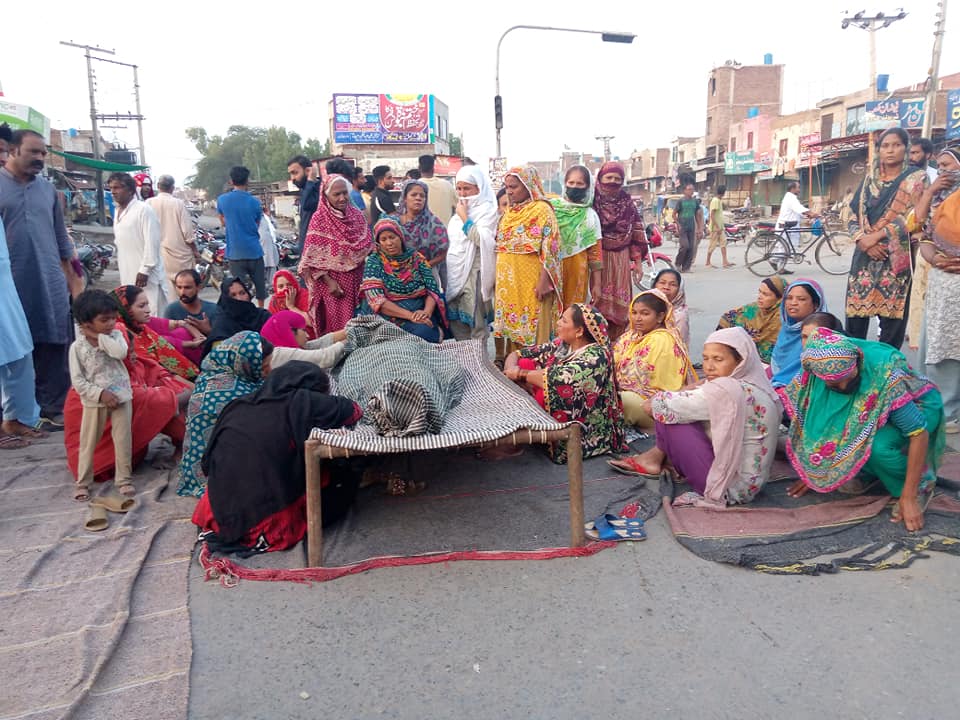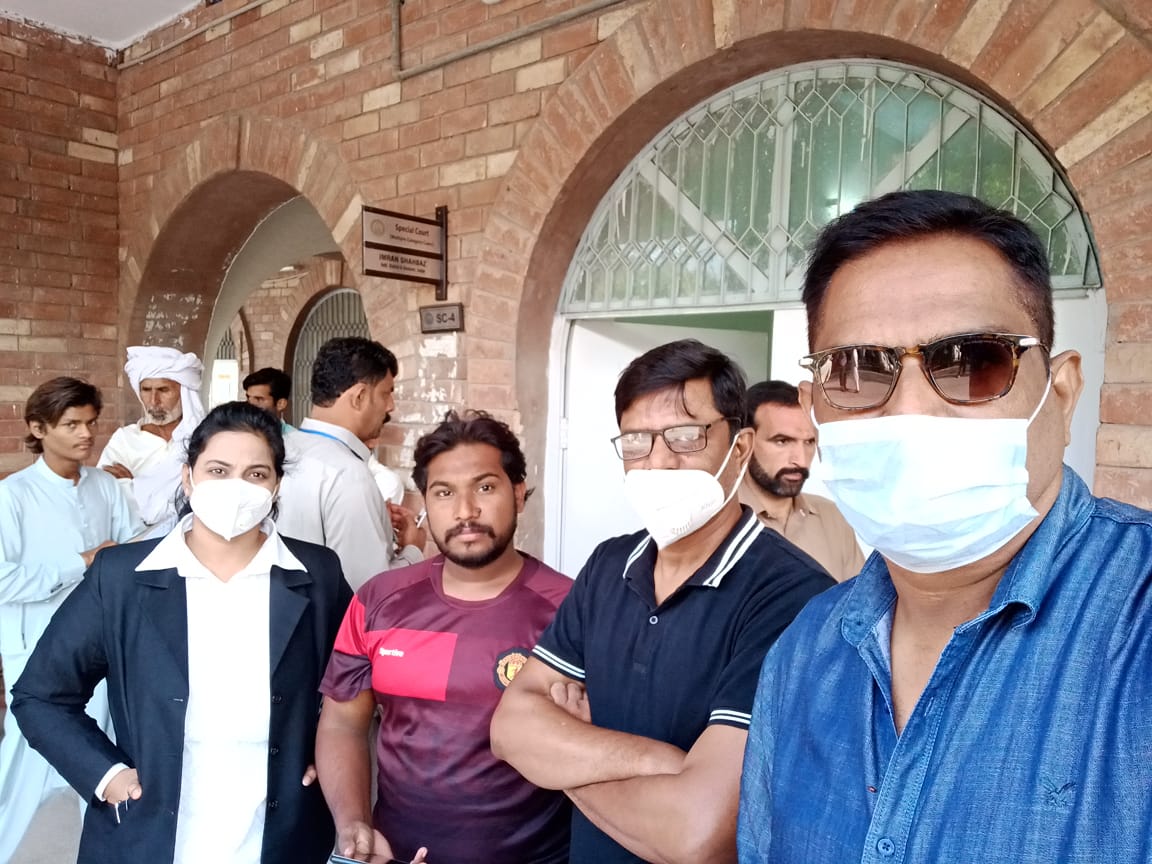A widow of a sanitation worker, who died along with his co-worker from poisonous gases in a manhole, is being pressured by the Punjab government to withdraw a case of criminal negligence against a sanitation department in Sargodha, Pakistan.
Mariam Bibi (32), the widow of Nadeem Masih (38) and a mother of six, has filed a case against the three supervisors of Sargodha Metropolitan Corporation (SMC) who forced her husband and Faisal Masih (28) to work at night in underground sewer lines without safety equipment.
Mariam herself is a trash picker, working as a daily wager with the SMC. She wakes up at 3am and goes out in the dark to pick trash and clean roads. She receives 17,000 rupees (less than USD 100) a month for this hard labour, insufficient to meet basic needs. Since Nadeem’s death, her children can no longer afford to attend school and the family is on the verge of starvation. Mariam says: “Despite serving the SMC for sixteen years, Nadeem was a daily wage worker [without a permanent contract] and so was not legally considered a government employee; hence, no compensation being given to the family.”
Nadeem and Faisal died during the night between 3 October and 4 October. Nadeem, along with Michael Masih (30) and Faisal, received phone calls at around 10pm from their supervisors Muhammad Amjad, Muhammad Rashid, and Muhammad Farooq to come to Chungi no. 9 to work on a 20-feet deep sewer line. Around 11:30pm, despite Michael telling his supervisor that the sewer line was poisonous and that they should wait for the gasses to evaporate, Farooq forced him to descend into the sewer without safety equipment.
After Michael fainted from exposure to poisonous gases in a manhole, supervisors forced Nadeem to rescue him, again without safety gear. At last, Faisal was ordered to go down to support both Nadeem and Michael. The two managed to rescue Michael before fainting themselves while still inside the manhole.
The Punjab Emergency Service staff (PES) had arrived by the time Nadeem and Faisal fainted but they refused to climb into the manhole, claiming there were still poisonous gases. Five hours later, Shahbaz Masih* (36), a sanitation worker, arrived at the scene, went down the manhole – again without safety equipment – and recovered the bodies.
No criminal negligence cases relating to the deaths of sanitation workers had been lodged in Pakistan before. But in this instance, Nadeem and Faisal’s families placed their bodies on Chungi no. 9’s Main Road, blocking the road, burning tyres and demanding legal justice.

Sargodha’s assistant commissioner Omar Daraz Gondal negotiated with the families and accepted their demands to disperse the protestors. The case was registered in the Satellite Town Police Station under Section 322 of the Pakistan Penal Code (PPC), which requires paying diyat or financial compensation to the heirs in the case of accidental death under Islamic law – not murder as the family had demanded. No criminal charges were filed against PES staff. “Gondal assured us that a detailed inquiry of the incident would be conducted and the victim’s families would be heard, but the promises proved only a tactic to end the protest, and we have not been included in the inquiry,” Mariam said.
The federal Finance Ministry set the diyat at 4,261,205 rupees (roughly USD 24,545). The case is presently being heard by the Sargodha District and judge Imran Shahzad. If the three suspects pay diyat, the amount will be 12,783,615 rupees (roughly USD 73,635).
However, only a month after the case was registered, the government and SMC are forcing Mariam to take 500,000 rupees and Faisal’s widow Anam Bibi (17), a mother of two, to take 1,900,000 (roughly USD 11,000) as compensation and withdraw the charges. So, the government registered the criminal case against the SMC supervisors to placate the protestors, only to later force the bereaved families of essential public service workers to withdraw the case for a few thousand rupees.
During meetings with SMC chief Khaliq Dad Gara, it became apparent that Sargodha’s commissioner Farah Masood had requested Punjab’s chief minister Usman Buzdar to approve 1.9 million rupees and a permanent job for Nadeem’s widow. The minister’s office has yet to respond.
Using funds from the Bill & Melinda Gates Foundation, Pakistan runs the Ehsaas program described as “the biggest anti-poverty project ever launched in the country”. The project is a poverty alleviation fund for the extreme poor, orphans and widows. If the government seriously intended to compensate Mariam and Anam, it could provide support from this program.

Sanitation workers are among Pakistan’s most socially alienated groups. A research study, titled Shame and Stigma in Sanitation, conducted by the Center for Law and Justice (CLJ) in 2019, found that the dehumanising treatment of sanitation workers stems from the Indian caste system, which is further rearticulated in religious overtones. The state needs to curb such practices that arise from cultural taboos and hinder the provision of health and safety training to workers as well as sanitation to the public.
Pakistan’s failure to address its inhumane treatment of sanitation workers jeopardises its international reputation. The European Union (EU) is considering reversing the Generalised Scheme of Preferences (GSP) Plus status, which grants Pakistan access to EU markets. GSP Plus status requires countries to implement conventions on human rights, labour rights, the environment and good governance – including the Elimination of All Forms of Racial Discrimination (1969), the Abolition of Forced Labour (1957), and concerning Forced or Compulsory Labour (1930). The forced labour of sanitation workers violates three conventions that Pakistan has ratified.
By providing legal justice to Mariam and Anam – as well as training, safety equipment and permanent contracts to sanitation workers – Pakistan can begin to right this wrong.
*The surname Masih means Messiah and does not mean that the workers are relatives to each other. More than half of the roughly five million Christian population in Pakistan has Masih as a surname.
Featured image: Nadeem Masih’s family demanding justice. Credit – Sweepers Are Superheroes.